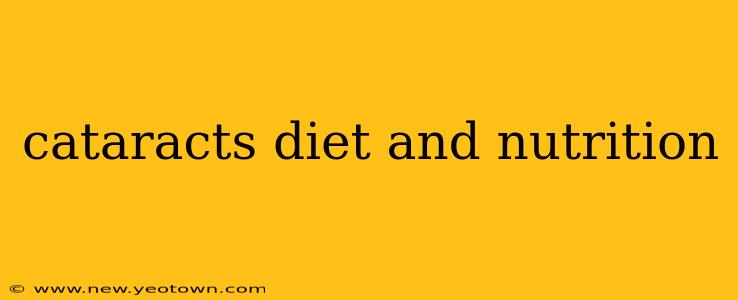The world felt a little blurry for Elsie. At first, she dismissed it as needing new glasses. But the haziness persisted, growing more pronounced with each passing day. A visit to her ophthalmologist delivered the diagnosis: cataracts. Elsie, like many, wondered if there was anything she could have done differently. Could diet and nutrition have played a role? The answer, while not a simple "yes" or "no," is nuanced and worth exploring. This article delves into the relationship between cataracts, diet, and nutrition, addressing common questions and providing evidence-based insights.
What are Cataracts?
Before we dive into nutrition, let's understand what cataracts are. Cataracts are a clouding of the eye's lens, leading to blurry vision, sensitivity to light, and difficulty seeing at night. They typically develop slowly and are more common in older adults, though they can occur at any age. While aging is a primary risk factor, several other factors, including lifestyle choices, contribute to their development.
Can Diet Prevent Cataracts?
This is a question many people ask, and the answer is promising. While no single diet can guarantee the prevention of cataracts, research strongly suggests that a healthy diet rich in specific nutrients can significantly reduce your risk. Think of it like this: building a strong immune system—you’re less likely to fall ill. Similarly, nourishing your eyes with the right nutrients builds resilience against cataract development.
What Nutrients are Important for Eye Health?
Several vitamins, minerals, and antioxidants have been linked to reduced cataract risk. Let's explore some key players:
1. Antioxidants:
- Vitamin C: A powerful antioxidant, Vitamin C protects cells from damage caused by free radicals, which are unstable molecules that contribute to cataract formation. Good sources include citrus fruits, berries, and leafy green vegetables.
- Vitamin E: Another potent antioxidant, Vitamin E protects cell membranes from oxidative stress. Nuts, seeds, and vegetable oils are excellent sources.
- Lutein and Zeaxanthin: These carotenoids are found in high concentrations in the macula (the central part of the retina) and are believed to protect against UV damage and oxidative stress, thus reducing cataract risk. Leafy green vegetables like spinach and kale, and egg yolks are rich sources.
- Beta-carotene: This carotenoid is converted to Vitamin A in the body, which is essential for eye health. Sweet potatoes, carrots, and apricots are rich in beta-carotene.
2. Other Essential Nutrients:
- Zinc: Plays a vital role in maintaining eye health and is often found in conjunction with other beneficial nutrients in the foods listed above.
- Omega-3 Fatty Acids: These healthy fats, found in fatty fish like salmon and tuna, help reduce inflammation and may offer some protection against cataract development.
What Foods Should I Eat to Support Eye Health?
A diet rich in fruits, vegetables, nuts, seeds, and fatty fish is ideal for maintaining eye health. Here's a delicious sample meal plan incorporating cataract-fighting foods:
- Breakfast: Oatmeal with berries and nuts.
- Lunch: Salad with spinach, salmon, and a light vinaigrette.
- Dinner: Sweet potato and black bean chili with a side of corn.
- Snacks: A handful of almonds or a small orange.
Does Sugar Consumption Affect Cataracts?
Can a high sugar diet increase cataract risk? Research suggests a correlation between high sugar intake and increased cataract risk. Excessive sugar consumption can contribute to oxidative stress, accelerating cataract development. Moderating sugar intake is crucial for overall health and may positively impact eye health.
Can Certain Supplements Help Prevent Cataracts?
Are there any supplements that can help prevent cataracts? While a balanced diet is the best approach, some individuals may consider supplements to ensure adequate intake of essential nutrients. However, it's crucial to consult with a healthcare professional or ophthalmologist before starting any new supplement regimen, as excessive intake of certain vitamins can be harmful.
Conclusion:
While a healthy diet can't completely eliminate the risk of cataracts, it plays a crucial role in minimizing the likelihood of developing them and slowing their progression. Embracing a nutrient-rich diet packed with antioxidants, vitamins, and healthy fats is an investment in your long-term eye health and overall well-being. Remember, this information shouldn't replace professional medical advice. Consult your ophthalmologist for personalized guidance and regular eye exams. Elsie, after learning about the impact of nutrition on cataracts, made dietary changes and felt empowered to take charge of her eye health journey. The journey to better vision starts with what you put on your plate.

